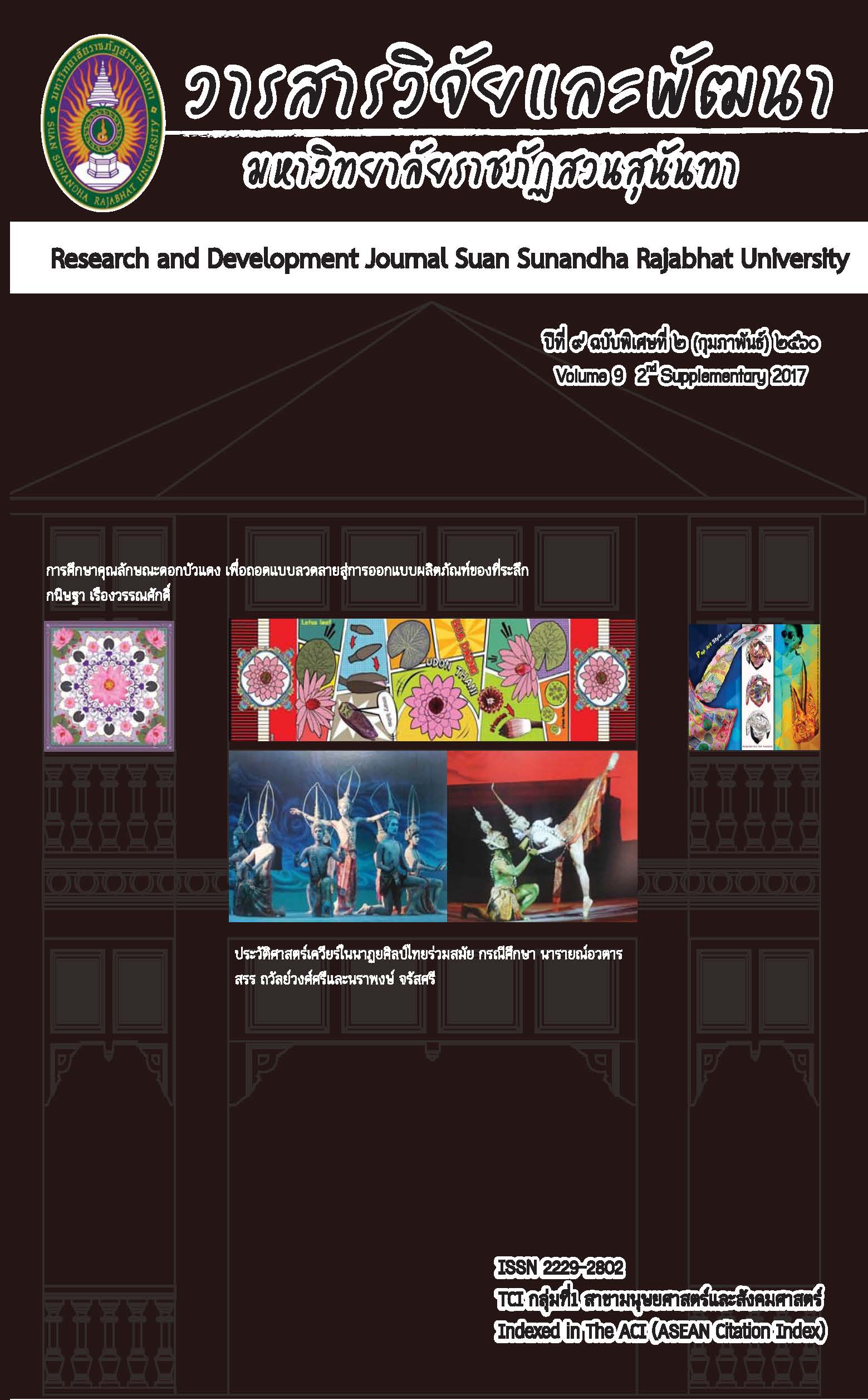มาตรฐานนักบัญชีที่ตอบสนองความต้องการของภาคธุรกิจ ภายใต้กรอบมาตรฐานกลุ่มเศรษฐกิจอาเซียน
DOI:
https://doi.org/10.53848/irdssru.v9i2.214222คำสำคัญ:
มาตรฐานนักบัญชีอาเซียน, ความต้องการของภาคธุรกิจบทคัดย่อ
การศึกษาเรื่องมาตรฐานนักบัญชีที่ตอบสนองความต้องการของภาคธุรกิจภายใต้กรอบ
มาตรฐานกลุ่มเศรษฐกิจอาเซียน ใน ด้านความรู้ทางวิชาชีพ จาแนกตาม อายุ กลุ่มตัวอย่างที่ใช้ในการ
วิจัยครั้งนี้ จานวน 210 คน โดยกลุ่มตัวอย่างจากการตอบแบบสอบถามฉบับสมบูรณ์ได้จานวน 200
ชุด ได้แก่ ผู้จัดการฝ่ายบัญชี เครื่องมือที่ใช้ในการวิจัยประกอบด้วยแบบสอบถามในการวิเคราะห์ข้อมูล
เชิงปริมาณโดยใช้สถิติ คือ การแจกแจงความถี่ ค่าร้อยละ ค่าเฉลี่ย ค่าเบี่ยงเบนมาตรฐานและทดสอบ
ความสัมพันธ์ของสมรรถนะวิชาชีพกับมาตรฐานนักบัญชีที่ภาคธุรกิจต้องการ โดยใช้การวิเคราะห์
สหสัมพันธ์แบบเพียร์สัน (Pearson’s Product Moment Correlation Coefficient) และข้อมูลโดยใช้
โปรแกรมคอมพิวเตอร์สาเร็จรูป SPSS for Windows
มาตรฐานนักบัญชีที่ภาคธุรกิจต้องการด้านความรู้ทางวิชาชีพ เป็นความต้องการมาตรฐาน
นักบัญชีอยู่ในระดับมาก พบว่า นักบัญชีมีการจัดทาบัญชีครบถ้วนและถูกต้องตามรูปแบบธุรกิจ
มีการนาเสนอข้อมูลจะต้องทันต่อเหตุการณ์และเป็นข้อมูลที่มีประโยชน์ในการบริหารธุรกิจ มีความรู้ใน
การออกแบบฟอร์มและเอกสารได้อย่างเหมาะสมต่อการใช้งาน มีการนาเสนอข้อมูลที่ถูกต้อง และ
ตรงประเด็นสามารถช่วยในการตัดสินใจและการบริหารธุรกิจ มีความรู้ในการจัดทาบัญชีให้เป็นไปตาม
มาตรฐานการบัญชีที่รับรองโดยทั่วไป มีความรู้ในการจัดทาบัญชีตามมาตรฐานการบัญชี การบัญชี
ภาษีอากร และเทคโนโลยีทางบัญชี
มาตรฐานนักบัญชีที่ภาคธุรกิจต้องการมีปัจจัยส่วนบุคคล ด้านอายุมีความสัมพันธ์กับ
สมรรถนะวิชาชีพตามมาตรฐานนักบัญชีที่ภาคธุรกิจต้องการอย่างมีนัยสาคัญทางสถิติที่ระดับ 0.05 โดย
พบว่าอายุ น้อยกว่า30 ปี มีสมรรถนะในวิชาชีพตามมาตรฐานนักบัญชีที่ภาคธุรกิจต้องการมากกว่า
นักบัญชีที่มีอายุมากกว่า 40 ปีขึ้นไป นักบัญชีที่มีอายุ 36 – 40 ปี และนักบัญชีที่มีอายุ 30 – 35 ปี
เอกสารอ้างอิง
features of the entrepreneur
Case study: enterprises in the
province Kalasin. Kalasin: Rajamangala
Northeastern University of
Technology.
Boyatizis, R., E. (1982). The Competent
Manager. New York: McGraw-Hill.
Business Development Department
(2000). Accounting Act BE 2543.
Nonthaburi: Welfare. Department
of Business Development.
Business Development, Department
(2004). Accounting Act BE 2547.
Nonthaburi: Welfare. Department
of Business Development.
Chaopanich, P., & Puttikoolsakorn, A. (2011). The
bookkeeper’s desirable features of
entrepreneurs in Muang Kalasin.
Kalasin: Rajamangala Northeastern
University of Technology.
Cheewapattanapan, T. (1998). Performance in
the insurance business, in the
opinion of the chief accountant
and bookkeeper. Bangkok: King
Mongkut Institute of Technology.
Dales, M., & Hes, K. (1995). Creating
Training miracles. Sydney: Prentice Hall.
Dejarin, P. (2004). Desirable Thai graduate.
Bangkok Post. 1 June 2004
Henchokchaichana, N., & Srichanpetch, S.
(2009). Accounting Theory Bangkok:
TPN Press Partnership.
Nationa lFAP. (2010). Accounting Standard No.
1 (Revised 2552), Presentation of
Financial Statements. Bangkok: P.
A., Livings.
Petchroj, L., & Chumniprasart, A. (2002).
Research Methodology Bangkok:
The fine print to print.
Petchroj, L., Angsuchote, S., & Chumniprasart, A.
(2005). Statistics for research and
technique to use SPSS Bangkok:
Rawin Printing Group.
Puvittayapan, A. (2004). Career Development in
Practice. Bangkok: H. R Centre.
Rungsarittikul, S. (2008). Performance
study of accounting officers in
the opinion of the accounting
department, head of accounting
and accounting practitioners in
entrepreneur. Nakornpathom:
Rajamangala University of
Technology Rattanakosin.
Sathawornwong, S. (2010). Documentation of
teaching in Financial Accounting,
and Accounting for Management
Units 1-7 (3rd edition). Nonthaburi:
Sukhothai Thammatirat University.
Spencer, M., & Spencer, M.S. (1993).
Competence at work: Models for
Superiors Performance. New York:
John
Sukphan, T. (2003). The desirable
characteristics of accountants for
the enterprise in Lumpang
province Chiang Mai: Chiang Mai
University.
Tejabanjerd, S. (1996). The desirable
characteristics of an individual
personnel in the opinion of
senior and middle executives in
real estate. Dissertation, University
of ArtsDepartment of Industrial and
Organizational Psychology Faculty
of Arts Thammasat University.
Vasavanwat, T., & Henchokchaichana, N.
(2001). Thai Accounting standards
in perception of the bookkeeper,
auditor and instructor of
accounting. Bangkok: DHARMNITI.
Vijitlekagarn, S. (2006). International
Standards (IES) and accounting
profession in the country,
Thailand Association of tabloid
accounts 3rd edition Section 1,
Dharmaniti Press Company Limited.
Virojrat, C., & et al. (2010). The
professional skills of an
accountant on success.
Wiley & Sons.Dales, M and Hes, K. (1995).
Creating Training miracles.
Sydney: Prentice Hall.
Yomchinda, T., & Sathawornwong, S.
(2007). Documentation of teaching in
Accounting principles.Units 1-8.
(Edition 12) Nonthaburi: a
Thammatirat Sukhothai Kingdom.
ดาวน์โหลด
เผยแพร่แล้ว
รูปแบบการอ้างอิง
ฉบับ
ประเภทบทความ
สัญญาอนุญาต
บทความที่ได้รับการตีพิมพ์เป็นลิขสิทธิ์ของ สถาบันวิจัยและพัฒนา มหาวิทยาลัยราชภัฎสวนสุนันทา
ข้อความที่ปรากฏในบทความแต่ละเรื่องในวารสารวิชาการเล่มนี้เป็นความคิดเห็นส่วนตัวของผู้เขียนแต่ละท่านไม่เกี่ยวข้องกับมหาวิทยาลัยราชภัฎสวนสุนันทา และคณาจารย์ท่านอื่นๆในมหาวิทยาลัยฯ แต่อย่างใด ความรับผิดชอบองค์ประกอบทั้งหมดของบทความแต่ละเรื่องเป็นของผู้เขียนแต่ละท่าน หากมีความผิดพลาดใดๆ ผู้เขียนแต่ละท่านจะรับผิดชอบบทความของตนเองแต่ผู้เดียว





